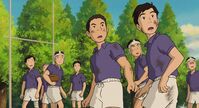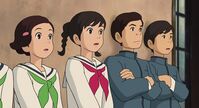The film is set in 1963, on the eve of the Tokyo Olympics. For Japan, the Tokyo Olympics have a special meaning. As a defeated country in World War II, Japan's national strength has declined, people's livelihood has withered, and the people's morale has also slumped. However, the success of the Olympic bid in the 1950s brought new historical opportunities to Japan. The government regarded it as a national undertaking and invested huge financial resources to drive unprecedented development from manufacturing to service industries. "Fast lane", and after the Olympic Games, it surpassed Britain, France and Germany to become the world's second largest economic power after the United States. At the same time, the successful bidding and holding of the Olympic Games has also strengthened the cohesion of the Japanese nationals, boosted the morale, and showed a thriving spiritual outlook. A similar feeling is also reflected in "Eternal Sanchome Sunset 64 Years".
However, in "Blooming Hillside with Poppies", the element of "Tokyo Olympics" only appears as a background, and its influence on the plot is indirect and limited. Or rather, it was the negativity brought about by the Olympic Games that triggered a thread in the story—the demolition of Qingliangzhuang (the Latin Quarter building). The student union and most of the students of Konan Academy showed great determination and hard work around the building's preservation and demolition, and finally moved the chairman of the board to keep the historic building that carries the fond memories of generations of students in the school. This event is the core of the whole film, that is, the protection and continuation of culture in the alternation of old and new. As we all know, in the process of urban development, a large number of buildings are bound to be rebuilt, just like the renovation plan of Yokohama in the film. At that time, the Japanese had an extremely urgent desire to shake off the shadow of the post-war era and build a brand-new country, so it was inevitable that overly radical proposals would emerge, leaving many historical buildings in a precarious situation. The advancement of this clue not only expresses the director's position, but also brings a nostalgic atmosphere to the face, and also reflects the vigorous vigor of the young generation at that time.
The soft part of this film is based on the love between Matsuzaki Kai and Kazama Jun. From having a good impression in the communication center of the student union, to drawing out a brother-sister relationship from an old photo, to relying on the parties to prove the innocence of blood, just from the development process of this relationship, it can only be said to be beautiful and conventional. Similar passages can be found in many movies. However, taking into account the experiences of their parents and placing it in a particular era at the time is enough to arouse the audience's interest. This is not only sympathy for these lovely lovers, but also sympathy for the involuntary and helpless choices of their parents, and deepens the hatred of war. The war not only caused intractable scars to the people of that time, but also caused great suffering to future generations.
Although there is a legacy of war in the film, the director uses the vitality of young people and the memory of that era to dispel the negative emotions to the greatest extent. The "new" and "old" have been organically combined, making the whole film present A bright upward force. The debut work of that year, "The Battle of the Earth and Sea", put Miyazaki Goro under tremendous pressure from the audience and his father. This "Slope of Poppies in Bloom" may not be very good, but at least it is tough in all aspects. It is a work with style and feelings, which is worth watching.
View more about From Up on Poppy Hill reviews











